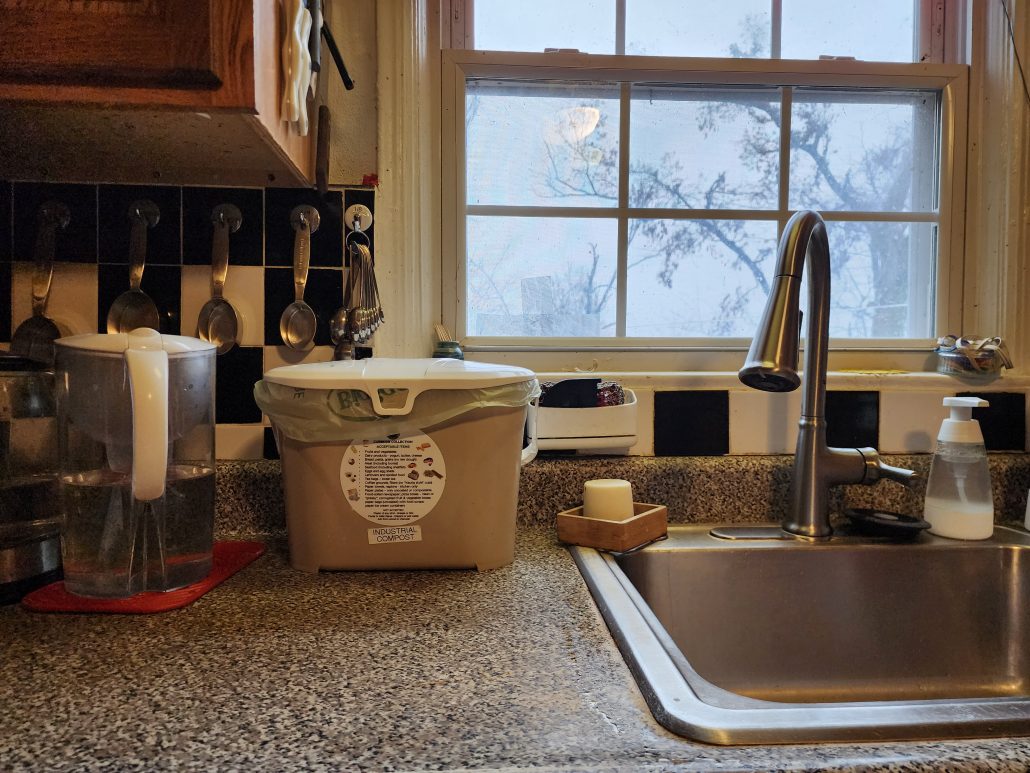By Lily Fountain

Now that chilly days have settled upon us in earnest, many of us are hunkering down inside. If you’re like me, you’re spending more time in the kitchen, especially as the holidays approach — and if your cooking adventures are anything like mine, you’re generating a lot of food scraps that can be composted. Thanks to a new program here in College Park, recycling food waste is easier than ever, thanks to inexpensive compost containers and free weekly collections.
Composting is one of the easiest and most productive things individuals can do for the environment. Such a simple process, and it is effective on many levels, from the most basic — your kitchen wastebasket won’t be so stinky — to the all-important ways composting combats climate change. Every morsel of food waste in a landfill produces methane, a greenhouse gas that’s highly dangerous and second only to carbon dioxide in amount now in the atmosphere.
A recent study conducted by Prince George’s County officials indicated that more than a third of the food that ends up in the county landfill could have been composted, instead. And here in College Park, we can compost so much — virtually any food scraps, including meat and bones, and paper towels and bags that are soiled with food debris, pizza boxes, and even paper ice cream containers. In fact, the list of things that cannot be composted is short — cooking oil, coated paper (plates, cups and the like), plastics and metal, and personal care items like facial tissues, toilet paper and diapers. And along that same line, no pet waste.

So picture this: You’re in your kitchen making eggs and toast. You crack the eggs into the pan and reach across the counter and drop the shells in your compost container — done! Your toast burns, so you drop that into the bin, also, along with those coffee grounds and the leftovers from your cat’s bowl. For dinner, you are making stew with lots of vegetable scraps — you got it — there go all the green tops and carrot bottoms, the peels and skins. Soup’s on, and you’ve done right by Mother Nature. That moldy cheese in the fridge? In the bin! On your pickup day morning or night before, you roll out the 13-gallon green cart or carry the handled 5-gallon bucket to the curb where you place your other trash cans.
The City of College Park has made their side of this very easy. Containers range in price from $5 for a kitchen caddy to $9 for a 5-gallon bucket and $13 for a 12-gallon cart. You can sign up online and pick up your containers at Davis Hall (at 9217 51st Avenue). The contractor that does the pickups provides a compostable bag for your cart or bucket every week — you can pick up more bags at most hardware stores or buy them online, if need be; just be sure to buy compostable bags, as plastic totally defeats the purpose. I use my garden hose to rinse out my big container each week; my countertop bin is small enough that I can pop it in the sink for a quick rinse (I’m careful to rinse the lids, too). You can put paper or cardboard in the bottom of your containers to absorb liquids, if you wish.
You now know everything about composting kitchen scraps! It isn’t rocket science, but it can take a few weeks before tossing scraps in your bin comes naturally — and then you’ll wonder why you waited so long! I look forward to seeing your bin on the street on collection day, and hope you take pride in contributing to a cleaner, healthier community.
For more information about the city’s curbside food scrap collection program, go to collegeparkmd.gov/CivicAlerts.aspx?AID=386







